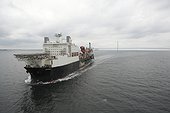World’s Largest Pipelay Vessel Enters the Baltic Sea to Lay Key Part of Nord Stream Pipeline
- Allseas’ Solitaire passes under the Storebælt Bridge en route to laying pipe in Russian and Finnish waters
- Dynamically-positioned pipelay vessel will operate without anchors in the congested Gulf of Finland
Aug. 22, 2010 | Zug | The Solitaire is en route for Russian waters, where it will start constructing the 342.5 kilometre section of the pipeline from kilometre point (KP) 7.5 in Russian waters to KP 350 in the Finnish Exclusive Economic Zone (EEZ). This part of the Baltic Sea presents particular environmental challenges, as it is congested and has many historic mine lines. The Solitaire is ideal for laying pipe in this environment, as it uses full dynamic positioning, dispensing with anchors, thus only touching the seabed with the pipeline.
The Solitaire is equipped with ten thrusters with an integrated propulsion power of 50,000 kW to counteract waves, currents and winds for precise manoeuvring and to maintain the vessel’s position. These thrusters keep the pipelay vessel automatically in place. They are steered by a computer system that constantly monitors the actual position of the vessel in comparison to its target position (in this case the agreed pipeline route). Should there be any deviation, the thrusters instantly propel it back into the target position, so that the vessel is always operating along the precise agreed route.
At 300 metres long (excluding stinger) by 40.6 metres wide the Swiss-based Allseas Group’s Solitaire is the length of three football pitches. It has a massive 22,000 tonne pipe-carrying capacity and work stations on several levels to enable it to receive and store the 12 metre long 23-tonne pipes, weld them together, test the welds, join the pipes to the pipeline, and lay it on the seabed along the agreed route at a rate of about 2.5 kilometres a day. The vessel accommodates 420 people and is equipped to lay pipe 24 hours a day 7 days a week.
Denmark’s Storebælt Bridge, the Great Belt Bridge, is one of Europe’s greatest bridges. It is the gateway to the Baltic Sea and is almost seven kilometres long. With a vertical clearance of 65 metres, the bridge allows even the world’s largest cruise ship to pass under it. No special precautions are needed to allow the Solitaire to pass.
The sections in Russian and Finnish waters adjoining the 342.5 kilometres of pipeline to be laid by Solitaire are being constructed by Saipem’s Castoro Sei pipelay vessel, including the section at the Russian landfall in Portovaya Bay, Vyborg. A third pipelay vessel, Saipem’s flat-bottomed Castoro Dieci, is responsible for constructing the pipeline in the shallow waters at and near the German landfall at Lubmin, near Greifswald.
When completed in 2012, the Nord Stream Pipeline will be 1,224 kilometres long and comprise 202,000 concrete weight coated steel pipes. The pipeline will transport 55 billion cubic metres (bcm) of natural gas a year to Europe.





